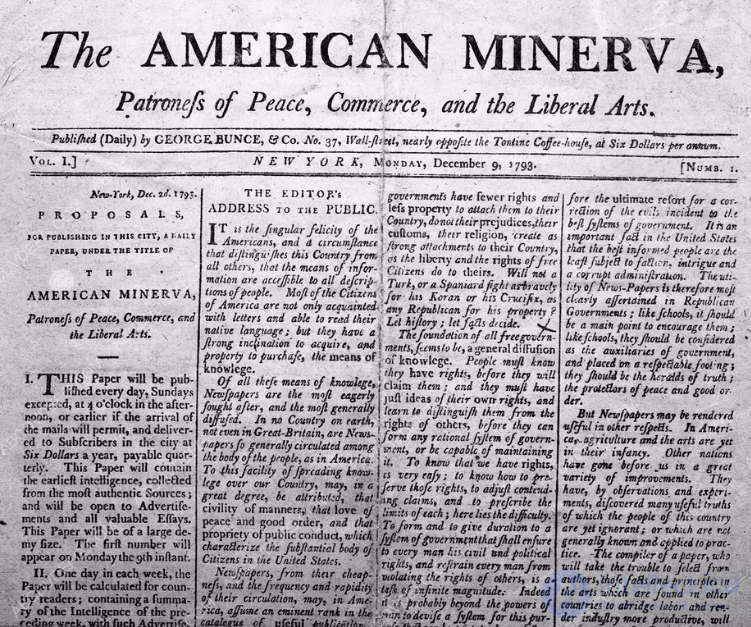Lecture
In the post-war period in the United States, two parties were formed - federalists and republicans. The federalists (who were in power in 1787–1800) advocated a strong state with an army and bureaucracy, high taxes and expenses for paying the state apparatus, debts and the development of industry. Republicans (they should not be confused with the current Republican "US party) were supporters of weak government, local government, minimal taxes, and government spending.
The recognized leader of the federalists, Finance Minister Alexander Hamilton, was certainly an extraordinary person. This bastard from an impoverished aristocratic family possessed brilliant abilities of an organizer, orator and journalist, exorbitant ambition and a risk-taking tendency before adventurism. He outlined his federalist program in a number of articles, among which the Federalist series of 85 pamphlets, which was co-authored with Madison and Jay and published in 1787–1788, was most famous. at the New York Independent Journal
The Republicans were led by a rich Virginia planter, Thomas Jefferson, author of the Declaration of Independence and the first secretary of state. Also possessing outstanding abilities, he, however, was the complete opposite of Hamilton. A homebody, not prone to risk and intrigue, Jefferson was a type of cabinet scholar and played the role of a banner rather than an organizer in his party.
Journalism was actively involved in the post-war political struggle. The end of the 18th century is the heyday of the party press in both the USA and England. Remaining private, newspapers of that time usually focused on political parties and served as their mouthpieces, rather than arbitrators, as is most often the case now. Almost all the newspapers of the young republic were divided into federalist and republican, so that in each more or less significant city both parties were represented by their own newspapers.
The most popular federalist newspaper was the daily Minerva, founded in 1793 in New York. Its publisher, Noah Webster, is a highly educated man, the author of the first works on the theory and history of journalism, which were posted on the pages of Minerva. One of the first he tried on the basis of generalizing the experience of the world press to determine its functions. Special importance was attached to propaganda and agitation. Moreover, the propaganda of "Minerva" was not limited to politics. Webster paid great attention to the promotion of schools and education. For the best coverage of international events, for the first time in America, he began to use not only European newspapers, but also the servants of a full-time European correspondent. Since 1796, the newspaper began to focus on business news and received a new name - “Commercial Editor”. So in the United States appeared the first specialized newspaper for businessmen. Webster himself gradually became disillusioned with politics, retired and devoted himself to a new occupation - the creation of an explanatory dictionary.

It is widely known how great is the prestige of George Washington in the United States, but it seems so only from the outside. And for republican newspapers, the first president was the expression of the ideas of the federalists, and therefore - a target for attack. “If one person is able to fool an entire nation, then such a person is Washington,” the Republican Aurora cursed. In its criticism of the first president, this newspaper went far beyond the limits of reasonable and declared him an English spy! Late XVIII century. He gave the first examples of journalism, specializing in disclosures. Not content with the usual abuse of political opponents, Callender began to study their biographies. The result was not long in coming. Soon he managed to find and publish a sensational news: the leader of a hostile party, the honorable father of the Hamilton family, kept his mistress at the expense of his ministry. fine and imprisonment for up to five years.
However, Jefferson - no matter how great the temptation was - did not resume the massive persecution of the press. His belief in the need for freedom of speech at any cost remained unshakable. In 1802, he himself declared that he was ready to defend even the right to lie, since the people would eventually be able to distinguish it from the truth. Very curious is his statement, made a little earlier: “If I had to choose whether to have a government without newspapers or a newspaper without a government, I would not hesitate to choose the latter.” An outstanding man of his time, Jefferson is not only one of the founders of the libertarian concept of press freedom, based on the principles of liberalism. In the above statement, it sounds not only the idea of press freedom, but also a commitment to the liberal program of weak government, reliance on private initiative and firm individualism.
Comments
To leave a comment
Journalism History
Terms: Journalism History